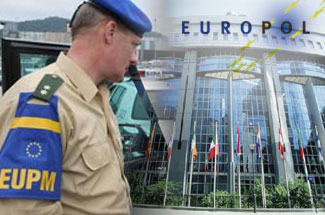Germany seeks to modernize policing across EU
Source: iht.com
 Interior Minister Wolfgang Schäuble said Monday that Germany would seek to make increased cross-border cooperation of the police and judicial authorities, particularly the exchange of DNA databases, part of European Union law despite strong opposition led by Britain.
Interior Minister Wolfgang Schäuble said Monday that Germany would seek to make increased cross-border cooperation of the police and judicial authorities, particularly the exchange of DNA databases, part of European Union law despite strong opposition led by Britain."Our aim is to create a modern police information network for more effective crime control throughout Europe," Schäuble said during a meeting of EU interior and justice ministers. It was the first informal gathering since Germany took over the EU presidency Jan. 1 and the first attended by the newest members, Bulgaria and Romania.
Seven EU countries already coordinate on cross-border issues including terrorism and illegal migration as part of the so-called Prüm treaty, which the seven signed in May 2005. The treaty allows comparison of DNA profiles, fingerprints and vehicle registration information, as well as the exchange of personal data. The signatories are Germany, Belgium, France, Luxembourg, the Netherlands, Austria and Spain, although France, the Netherlands and Belgium have yet to ratify the treaty.
Schäuble said Monday he wanted the Prüm accord to be enshrined in EU law, which would require all member states to share such data.
But Britain, Ireland, Poland and the Czech Republic oppose the idea, questioning not only the cost but also whether the European Commission would gain more power over police and judicial issues at the expense of member states.
Responsibility for justice and interior matters straddles the rights of individual states and the commission, but member states can veto new measures.
"Interior affairs have always been jealously guarded by the individual member states," said Andreas Mauer, an EU expert at the German Institute for International and Security Affairs in Berlin. "I am skeptical that Schäuble will be able to get the Prüm treaty transposed into the legal framework of the EU. The opposition would be too great because it raises many questions, specifically the democratic control over these databases and how much power would be passed to Brussels."
Even Brigitte Zypries, Germany's justice minister, voiced skepticism. "Yes, I continue to oppose the Prüm treaty becoming part of the EU law," she said. The Justice Ministry wants stringent controls over how the databases are used and how access is allowed.
British officials said Monday they had several reservations about the plan, notably its cost. They also opposed the use of sky marshals on commercial aircraft to thwart possible terrorist attacks, a measure the Prüm treaty members support.
Schäuble brushed aside concerns about the expense, saying it had cost Berlin only €930,000, or $1.2 million, to create such a database.
Frank Fahey, Ireland's state secretary for justice, equality and law reform, said that unless London backed the German initiative, it would be impossible for Ireland to accept it because of Dublin's special police cooperation and exchange of extensive information with Britain.
Poland and the Czech Republic, which with Britain also oppose greater political integration of the 27-member bloc, supported London's objections.
Schäuble said police cooperation among the Prüm treaty countries was yielding results nonetheless.
"For example, under the treaty, Austria and Germany have been able to check the contents of their national DNA databases against each other since last December, the first time that countries granted each other access to their national police databases," Schäuble said. He added that Finland, Italy, Portugal and Slovenia have said they intended to sign the Prüm treaty.
With growing support for closer police cooperation, Schäuble said he would begin formal discussions next month with justice and interior ministers to consider how the treaty could be enacted into EU law.
Article from: http://www.iht.com/articles/2007/01/15/news/germany.php






















